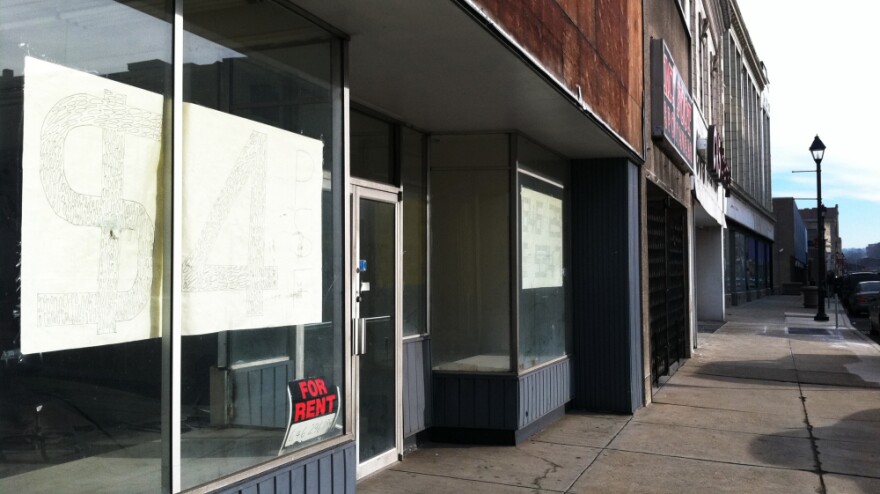Republican presidential candidates have had some harsh words about the role of government aid in the Obama administration.
Former House Speaker Newt Gingrich calls President Obama the " food stamp president" and says more people are on food stamps than ever before because of his policies.

Former Massachusetts Gov. Mitt Romney has said that Obama favors an "entitlement society," where people worry about the size of the check they can get from Washington.
And former Pennsylvania Sen. Rick Santorum has accused the president of destroying the work ethic through "the narcotic of government dependency."
The GOP candidates argue that people will get back on their feet more quickly if government assistance is limited.
But in areas still struggling with a bad economy — such as McKeesport, Pa. — those getting aid say it's keeping them afloat. And they worry what cutting them off would mean.

McKeesport has been in bad shape ever since the steel industry left in the late 1980s, taking with it thousands of good-paying jobs.
Today, the city — which Santorum once represented in Congress — is a shadow of its former self. Downtown offices are shuttered and abandoned, as are hundreds of homes. The population, once 55,000, is down to 19,000. Many of those who remain are unemployed or underemployed. The poverty rate is twice the national average.
Laurie MacDonald was born here and now runs Womansplace, a center for victims of domestic violence.
"It was a thriving town at one point," says MacDonald. "What's mostly left in town are human-services organizations and government organizations, like the Department of Welfare."
She says many here rely on government support, not because they want to but because, in many ways, they're stuck. They're either unemployed or don't earn enough to get by on their own. And they're too poor to move.
"Can you imagine making $25,000 a year? And you have a family. You have kids. You have a home. You have heating bills. How are you going to make ends meet?" she asks.
Sherri Smith, who works part time at Womansplace, is one of those who say they need help. Two years ago, she says, she fled an abusive, drug-using husband, with the clothes on her back and a young son.
She bristles at Santorum's calling the assistance she gets the " narcotic of government dependency."
"They don't understand how normal everyday people have to live, how people have to break a penny in half and decide, 'OK, are we going to have lights this month or are we going to eat?' " she says.
Smith brings home less than $1,000 a month and says without food stamps and medical help for her son, she couldn't keep a roof over her head and go to college, which she is now doing so she can earn more money.
"I need the assistance so I can get away from it," says Smith.
And that, in many ways, is the debate. Is government aid a tool or a crutch? Romney, Santorum and other Republicans say the current system isn't working. They think there should be deadlines and that states should craft their own programs. But even that worries people here. Last week, Pennsylvania said it wants to end food stamps for those with more than $2,000 in the bank.
Jim Brewster, the city's former mayor and now a Democratic state senator, says McKeesport is trying to turn things around. He points to a new $9 million railroad overpass, built with federal stimulus funds. Officials hope it will attract businesses to the old U.S. Steel site.
Brewster says there's been some success. U.S. Steel just opened a new pipe products facility in town, and the city is preparing to drill for natural gas.
But, he asks, until more businesses come in, what are residents to do?
"We're in a foxhole," he says. "We've got 19,000 people. We're obligated by law and by oath to take care of them and that requires in some cases entitlements. That's not anybody's preference."
He and others in McKeesport say they're frustrated with the tone of the political debate, which seems to them more about pointing fingers than finding an answer.
"People are tired of the gridlock, they're tired of the arguing, they're tired of the fighting," says Brewster. "And I don't care whether it's Rick Santorum or President Obama, [or] who it is. You can stand up and say 'jobs, jobs, jobs' all you want. You gotta produce."
Jamaica Bray, an unemployed, single mother of four in McKeesport, gets welfare payments, food stamps and Medicaid, and lives in public housing. "It's like dead ends everywhere you turn," she says.
Right now, she says she'd take any job. But Bray also thinks some people stay on government assistance because there's a disincentive to leave it behind. She notes that benefits, such as health care and rental assistance, can be abruptly cut off if you earn even a small amount.
"Then people say, 'Bam, I'm not going to work. I may as well stay on welfare. I was getting more while I was on there,' " she says.
Earlene Coleman, pastor of the Bethlehem Baptist Church, thinks people need help getting off government aid, that they can't do it alone. She agrees with Gingrich, Santorum and other Republicans that some people are too dependent on help and they should be given deadlines.
But, she says, they should also be told, "I'm going to teach you how to get from here to there" — whether it's through job training or parenting classes, whatever people need to get back on their feet and stay there.
The Republican presidential candidates have said in fact that they want to tie ending government aid to programs, such as job training. But McKeesport residents would like to see some specifics, because they say they've been abandoned before.
Copyright 2020 NPR. To see more, visit https://www.npr.org. 9(MDAxODQzOTgwMDEyMTcyNjI4MTAxYWQyMw004))


